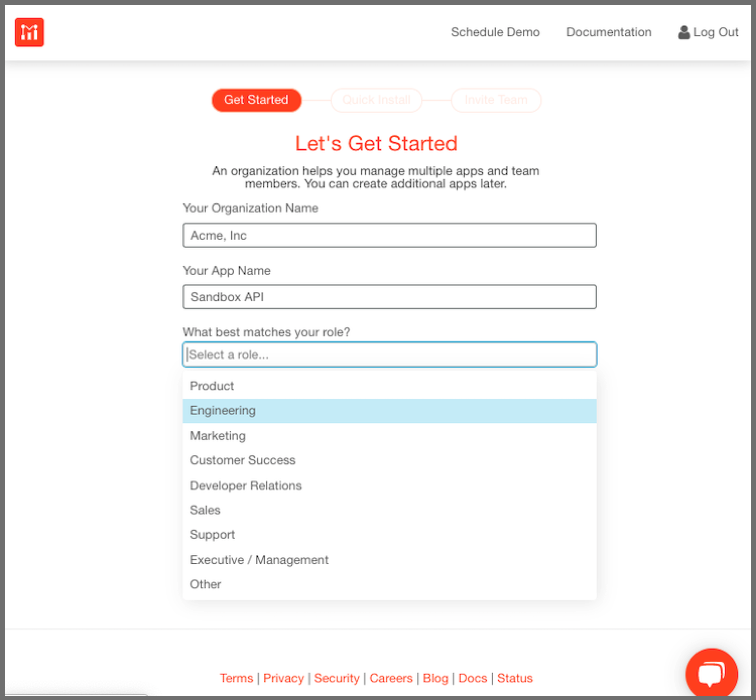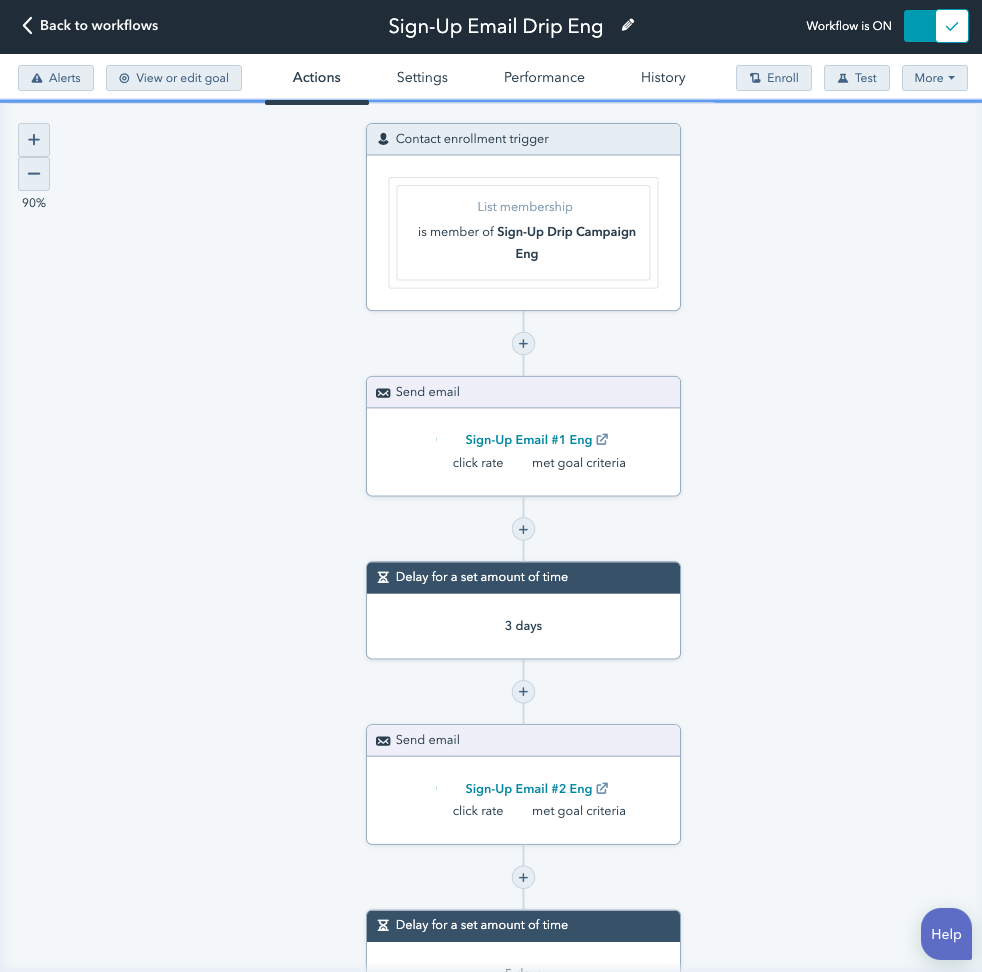How to Improve Developer Experience by Guiding Developers with Customer Lifecycle Emails using Moesif with Hubspot or Salesforce
Making your company successful hinges on your customers being able to stand your product up, and gain value from it. When you’re using inbound marketing to drive customer acquisition, email doesn’t have to be relegated to second-class citizen status. We argue that email is one of the most powerful channels of communication between B2B companies and their customers.
If you’re focused on developers, then you should seriously consider deploying lifecycle emails as a key component of the product experience. This is especially true when you’re following a self-service model, since the only way to support scale is to automate as many processes as possible. Internally, we utilize our own API analytics tool, with a HubSpot CRM integration, to act as a catalyst to move developers through the adoption funnel.
Track user/website behavior and then use that data to drive your drip campaign—encourage your devs to complete their integration and try all of your features
Steps in Building a Winning Lifecycle Email Program
By sending timely and stage-appropriate emails, instead of only sending top of funnel ones, you’ll be able to build long-term customer relationships at scale. This blog post shows you how we went about it at Moesif and in turn grew our customer base to thousands of developers:
Step 1. Integrate Your CRM With Moesif
Moesif has integrations with Salesforce and HubSpot, so that you can pull API parameters right into your CRM tool. Things to bear in mind when you’re setting up your integration:
- Users in Moesif correspond to contacts in HubSpot and accounts in Salesforce,
- Companies in Moesif correspond to companies in HubSpot and accounts in Salesforce,
- Any field can be mapped from Moesif to your HubSpot or Salesforce object
In our internal implementation we mapped a number of fields from Moesif’s API analytics platform to HubSpot objects. Example fields include the following:
| Field | Description |
|---|---|
| During sign up the customer provides their email | |
| Role | During sign up the customer provides their role |
| Plan | Plan the customer is subscribed to |
| Date first signed up | When the customer first integrated your platform |
| Date first API call | When they sent their first API call |
Moesif supports mapping any field to your HubSpot object including when customers first integrated with your platform, their first API call, and how much API usage have they used up.
Step 2. Segment Emails Based on Discipline
Don’t send the same email to everyone, at best that’s a waste of time, and at worst it’s actively damaging your customer relationships. Segment your customers by role and then match the messaging to their specific discipline. Many API platform companies sell predominantly to developers, but product managers, CSM, developer relations and executives might all be possible buyers, or at least important in the buying decision.

Step 3. Set Up Email Workflows
Email workflows are a series of automated emails that trigger based on user/website behavior. By choosing from dozens of triggers, conditions, and actions, you can send the right email to the right customer at the right time. Using these drip email campaigns, you can put lead nurturing on autopilot and scale your onboarding infinitely.
Just like the marketing rule of 7 developed by the movie industry in the 1930s (they discovered that you needed to “hear” the advertiser’s message at least 7 times before you’d buy the product), email workflows make it easy to remain top of mind with your customers.
Best practice calls for providing real value in your communiqués, not just repeatedly asking for the deal. We’ve found that a cadence of 2-3 pieces of targeted content, followed by an offer of assistance or promotion, is about the right balance.
Step 4. Send Out Time-Based Emails
In self-service adoption your customer should have entered their role during the sign up process. We went to great lengths to create different workflows for each category of customer: developer, product manager, customer success professional, developer relations, executive, etc.

Immediately after sign up, each new customer is sent a targeted welcome email introducing them to the product’s features most appropriate for their discipline. For example, developers’ messaging is around spending less time debugging and more time developing, whereas product managers is about driving higher adoption and engagement. Similarly, the emails’ call-to-action buttons (entitled “Solutions for engineers” or “Solutions for Product Managers”), redirect to separate sections of our website.
After a set amount of time, we’ve found a spacing of 3-5 days works well, the next email in the sequence is sent. Again, content is targeted for the customer’s discipline, developers are sent technical articles and how-to guides, whereas product teams receive business eBooks and case studies. Gentle reminder emails are interspersed between the value-add content, such as offers for helping with integration or for a consult to get the most out of your API initiatives.
The customer and his company remain in these sequences until our platform is integrated and API calls commence. Once the first API call is made, we move to other workflows in behavior-based emails.
Step 5. Send Out Behavior-Based Emails
Behavior-based emails based on API metrics is where the real magic takes place. By speaking to your customers with messages that match their particular place on the lifecycle spectrum, you make the interaction super on-point, more likely to help and more likely to garner customer goodwill.
We’ve found the following behavior-based API-centric emails to be a good starting point:
| API Metric | Email topic |
|---|---|
| Making the first API call | Congrats on getting set up |
| Approaching plan quota | Plan warning |
| Over plan quota | Plan upgrade |
| Stream of 400/500 errors or SLA exceeded | Error warning to check integration |
| Using a deprecated or vulnerable SDK | Upgrade warning |
| Outage | Global outage warning |
Obviously, you can combine time and interrupt-driven triggers, such as the following:
| API Metric | Email topic |
|---|---|
| No API calls in first 7 days | Integration help with docs & playbook |
| More than X errors, on endpoint Y, in last Z hours | Error warning to check endpoint Y |
| More than 100 API calls in last 24 hours | CSM notification |
Marrying Moesif with Your CRM for Improved Onboarding
Email is a core part of your product and brand. By marrying your CRM to Moseif’s API analytics platform you can leverage API usage data and create hyper-personalized customer lifecycle emails. The combined solution can be a real catalyst that engages developers and accelerates them through the adoption funnel.
 Create Amazing Customer Lifecycle Emails With Moesif
14 day free trial. No credit card required.
Learn More
Create Amazing Customer Lifecycle Emails With Moesif
14 day free trial. No credit card required.
Learn More



